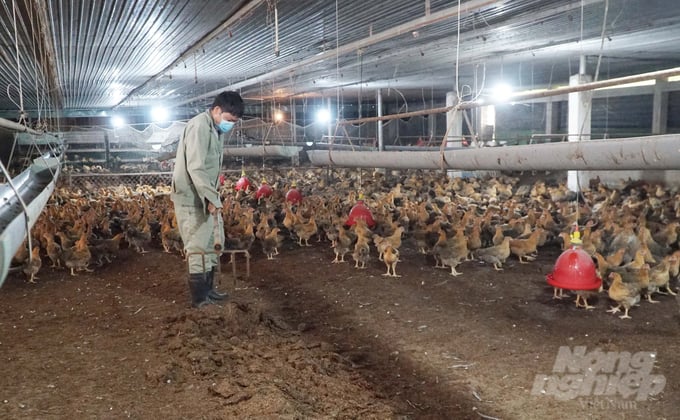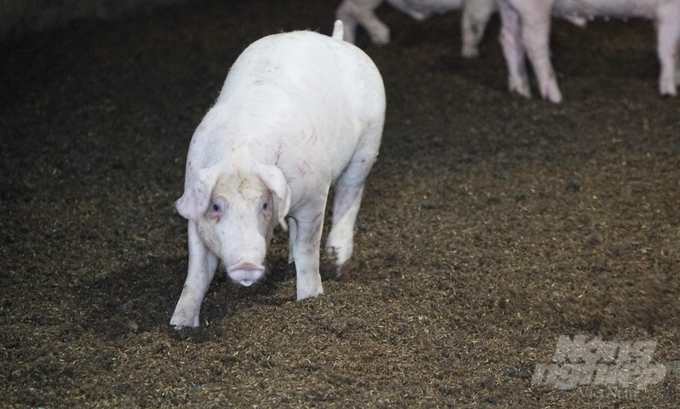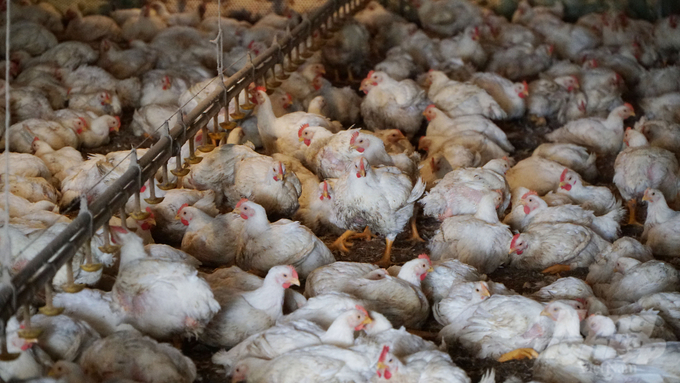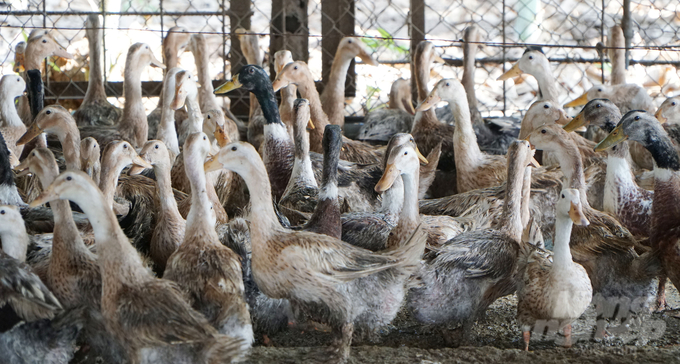December 15, 2025 | 11:39 GMT +7
December 15, 2025 | 11:39 GMT +7
Hotline: 0913.378.918
December 15, 2025 | 11:39 GMT +7
Hotline: 0913.378.918

Biological bedding not only helps livestock stay healthy but it can also be used as fertilizer for crops. Photo: Le Binh.
Ba Ria - Vung Tau currently has a total herd of more than 401,000 pigs and more than 6.8 million poultry with a household farming rate of nearly 50%. In recent years, farmers have paid more attention to the management and treatment of livestock waste with the application of biological bedding.
Starting to raise chickens in 2018, Ly Trung Van (Da Bac commune, Chau Duc district) chose to capitalize on biological bedding. “Chickens raised in cages with biological bedding grow faster as it eliminates odors around the cage, and thus keep the environment unpolluted,” he said. Thanks to this method, Van's farms have well-grown chickens and suffer little damage. Economic efficiency also shows more stability.
As for Nguyen Minh Ly's farm (in Toc Tien commune, Phu My town), the chickens grow faster and the loss rate is significantly reduced after he makes full use of biological bedding. Despite raising a few hundred chickens per batch in a modest area, Ly's chickens still have firm meat, and they can even dig around freely, following their natural habits.
Ly’s family is restocking to prepare for the Tet market. Although the risk of disease is still very high, with good isolation of the source of the disease and the chickens raised with biosafety in consideration, Ly is still confident to make a “sure hit” with this crop.

Raising livestock on biological bedding keeps the livestock healthy, making them less susceptible to disease while mitigating environmental pollution. Photo: Le Binh.
“Households using biological bedding currently account for more than 40% of the total number of livestock households in the province. This model is being encouraged by the agricultural sector because it helps create a clean farming environment, avoiding diseases. Farmers can save on labor and other costs while also contributing to environmental protection. The model can provide a source of clean food for consumers and aim for sustainable farming,” said Phan Van Trai, Head of the Department of Professional Affairs, Ba Ria - Vung Tau Sub-Department of Livestock Production and Animal Health.
Regardless of the visible benefits, Ba Ria - Vung Tau Sub-Department of Livestock Production and Animal Health recommends livestock farmers not be negligent in the face of disease risks. The weather during this time period is changing erratically, so it is easy to create conditions for disease to appear. This is the time when livestock farmers should focus on restocking. If they are not careful, it is easy for farmers to lose everything in the face of an epidemic.

Ba Ria - Vung Tau currently has about 6.8 million poultry, mainly raised on farms. Photo: Le Binh.
According to Ba Ria - Vung Tau Department of Agriculture and Rural Development, the growth rate of the livestock industry is fluctuating at 4% - 4.7%, with the pigs and poultry gaining the spotlight. The herd of buffalo, cows, goats, and sheep also increased from 2.1% - 4.8%, considered a bright spot in the province’s livestock development.
According to Phan Van Trai, the orientation of Ba Ria - Vung Tau People's Committee is to develop a stable and sustainable agricultural sector. The focus is on disease safety in particular, protecting human health and moving towards the production of goods to meet consumer and export demands.
Up to now, the livestock farm model has developed rapidly in terms of the number of farms, herd size and application of high technology, gradually associated with slaughtering and concentrated processing to improve food quality and safety.

The rate of household-level livestock farming in Ba Ria - Vung Tau remains high, posing a major challenge in preventing diseases in livestock. Photo: Le Binh.
Ba Ria - Vung Tau still has many wasy to further develop livestock, but it does not run after quantity. Compared to other provinces in the region, although this locality has a smaller herd, the farm size and productivity are high.
Despite the positive results, livestock farming in Ba Ria - Vung Tau in reality is still small-scale, accounting for a high proportion of approximately 70%. To minimize the risk of economic losses in the context of increasing input materials, livestock farmers need to proactively implement biosecurity measures along with disease prevention and control so that livestock can achieve high productivity and quality in the Tet sale.
Translated by Samuel Pham

(VAN) Northwestern women not only preserve traditional weaving but also leverage their cultural identity to create livelihoods, while spreading it to tourists through authentic experiences.

(VAN) Based on research results and production practices, the international scientific community evaluates UNI 126 as one of the world's best Panama disease-resistant banana varieties.

(VAN) More than 10,000 hectares of Cavendish bananas (Philippines), once abandoned due to the Panama Fusarium wilt Tropical Race 4 (TR4) disease, have now been brought back into production by switching to the Formosana variety.

(VAN) After signing, two sides will organize delegations to exchange experience and conduct field surveys in preparation for cooperation projects.

(VAN) Dr. Mary Grace B. Saldajeno, an expert from Dole Corporation, stated that controlling Panama disease in banana plants requires the use of disease-free, resistant varieties, combined with mechanical and physical measures.

(VAN) Viet Nam has not only asserted its position as an agricultural powerhouse but has also become a strategic partner in transferring sustainable agricultural technology to developing countries.

(VAN) On December 12, the Ministry of Agriculture and Environment organizes the Forum 'Sustainable Development of Vietnam's Marine Economy by 2025'.